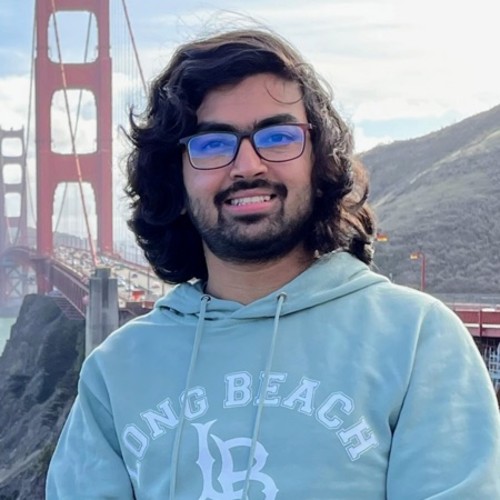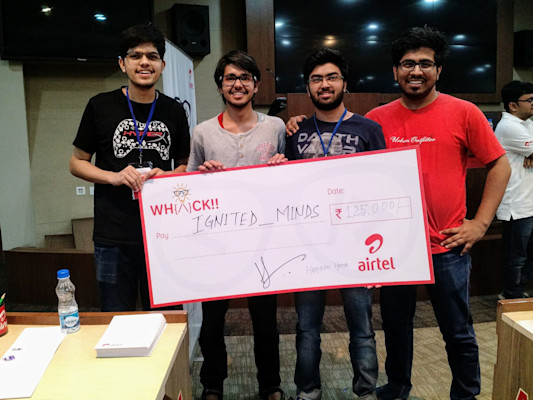Anudit Verma, 26

Anudit vividly remembers how excited he was as a 9-year-old when visiting his aunt for the summer in Lucknow, India after she bought a cutting-edge desktop PC—an Intel Pentium III decked out with Windows 98, 64 MB of RAM, and a 10 GB hard drive. He fell in love with the machine, and once his aunt got a dial-up internet connection, the scope of his exploration hugely expanded. After several summers Anudit knew that he wanted to pursue technology, so his dad bought him a computer for their home. He went on to ace computer education classes in high school, learn to code, and pursue computer science at Guru Gobind Singh Indraprastha University. Anudit filled his time exploring various clubs, projects, and research topics, and was eventually drawn to Open Source programming which he pursued during the Google Summer of Code Program (GSoC). At GSoC, Anudit integrated the Open Supported Data Interface API into CiviCRM to enable interoperability among various other management systems to help lower integration costs and maintain cross-platform data consistency. He worked closely with mentors from around the world, and GSoC not only exposed him to real-life software development that impacts millions of users, but it also helped him hone time-management skills when working with people on opposite sides of the world.
As a mentor, Anudit believes in building a strong community and in empowering hackers. After GSoC, Anudit was appointed head of his university’s Open Source Learning Club, which involved teaching git and giving free open-source introductory sessions to freshmen students during his weekends. As his classes became more popular, students came from other schools such as Delhi Technological University, IIIT-Delhi, and Netaji Subhas Institute of Technology just to learn from him. The program gave rise to three GSoC admits in 2016, and six the following year. Students who attended his classes went on to make significant contributions at Mozilla, VLC, FOSSASIA, and other notable Open Source organizations. Anudit was amazed at his ability to inspire and teach such a large group of people and help them achieve their dreams, and he feels immensely proud when he gets invited to give guest lectures and mentoring sessions to help more young minds grow at his alma mater.
Forming the team Ignited_Minds with other hackers, Anudit attended Smart India Hackathon in Spring 2017, a massive nationwide hackathon under the aegis of their Prime Minister. They made it to the finals of the event, and despite not winning the event, they realized that their team spirit gave them powerful momentum. They carried this momentum into a hackathon winning streak, taking first place at Airtel WHack Hackathon, EY Intelligent Automation Hackathon, and two national-level corporate hackathons. The winning streak even continued abroad, winning the global-level hackathon 5G FWD UltraHack at the University of Oulu in Finland, claiming the Social Media Challenge. Ignited_Minds won numerous other hackathons and coding challenges, and off the wave of these victories they formed the organization StreetHack, a platform that helps institutions hone a culture of collaboration and progressive learning. StreetHack has two tracks that tailor to enterprises and universities: the enterprise track helps companies with product research and development, testing, market research, and engagement with enterprise personnel, while the university track helps hone an educational culture and bridge the gap between academia and industry.
The hackathon community launched Anudit into the technology sphere, prompting him to pursue a Master’s Degree in Computer Science at California State University Long Beach, and allowing him to find incredible opportunities as a mentor at various MLH North American hackathons. His journey has been unique, meeting awesome hackers, mentors, and organizers who taught him how to not only take a different perspective in technical challenges but also in his everyday life.
One of Anudit’s favorite winning projects he helped make was a “Contract Reader Tool” at EY Hackathon Fall 2017. The event was hosted by one of the big four accounting companies of India and had hackers develop innovative solutions for regulatory- and tax-related problems. The teams were challenged to develop digital prototypes to help simplify dynamic business functions including taxes, law compliance, or supply chains through the use of disruptive technologies, such as robotics process automation, machine learning, natural generation, and Natural Language Processing (NLP). Anudit’s team created a hack that used NLP on a dataset of company contracts to perform contract completeness checks, extract relevant clauses, execute applicability checks, and subsequently share the resulting report. The tool also predicted the most likely tax deduction rates at the source applicable to particular transactions by reading keywords from the invoice and mapping them against a programmed rate master. Anudit’s team even got their project covered in an online news article, which was an amazing highlight for him.
It is easy to look at successful individuals and only see their success or fame, yet that is only the tip of the iceberg. Their journey surely involved thousands of hours put into improving their skills, but even that is just a part of the submerged iceberg. The deepest points of the iceberg are made of endless efforts, late nights, hard work, discipline, rejection, and dedication. Anudit has been on both sides of this iceberg, admiring the tip from above the water, not knowing what lies underneath, and submerged in the water, spending tremendous amounts of effort and focus on making an idea come to life during a hackathon. Whenever he mentors at hackathons, Anudit has a deep sense of respect for hackers who diligently work on their innovative ideas because he knows what it is like to be in that place. When hackers approach him, he makes sure to help them wholeheartedly, going through great lengths to untangle their problems because he wants them to succeed if they truly desire it. Anudit loves giving back to the community that made him who he is today, and by helping others gain useful information and experiences, he hopes to build their icebergs to the point that they can break above the surface and find their own success.
You can learn more about Anudit on his website here.
Quick Facts

Anudit Verma, 26

Anudit vividly remembers how excited he was as a 9-year-old when visiting his aunt for the summer in Lucknow, India after she bought a cutting-edge desktop PC—an Intel Pentium III decked out with Windows 98, 64 MB of RAM, and a 10 GB hard drive. He fell in love with the machine, and once his aunt got a dial-up internet connection, the scope of his exploration hugely expanded. After several summers Anudit knew that he wanted to pursue technology, so his dad bought him a computer for their home. He went on to ace computer education classes in high school, learn to code, and pursue computer science at Guru Gobind Singh Indraprastha University. Anudit filled his time exploring various clubs, projects, and research topics, and was eventually drawn to Open Source programming which he pursued during the Google Summer of Code Program (GSoC). At GSoC, Anudit integrated the Open Supported Data Interface API into CiviCRM to enable interoperability among various other management systems to help lower integration costs and maintain cross-platform data consistency. He worked closely with mentors from around the world, and GSoC not only exposed him to real-life software development that impacts millions of users, but it also helped him hone time-management skills when working with people on opposite sides of the world.
As a mentor, Anudit believes in building a strong community and in empowering hackers. After GSoC, Anudit was appointed head of his university’s Open Source Learning Club, which involved teaching git and giving free open-source introductory sessions to freshmen students during his weekends. As his classes became more popular, students came from other schools such as Delhi Technological University, IIIT-Delhi, and Netaji Subhas Institute of Technology just to learn from him. The program gave rise to three GSoC admits in 2016, and six the following year. Students who attended his classes went on to make significant contributions at Mozilla, VLC, FOSSASIA, and other notable Open Source organizations. Anudit was amazed at his ability to inspire and teach such a large group of people and help them achieve their dreams, and he feels immensely proud when he gets invited to give guest lectures and mentoring sessions to help more young minds grow at his alma mater.
Forming the team Ignited_Minds with other hackers, Anudit attended Smart India Hackathon in Spring 2017, a massive nationwide hackathon under the aegis of their Prime Minister. They made it to the finals of the event, and despite not winning the event, they realized that their team spirit gave them powerful momentum. They carried this momentum into a hackathon winning streak, taking first place at Airtel WHack Hackathon, EY Intelligent Automation Hackathon, and two national-level corporate hackathons. The winning streak even continued abroad, winning the global-level hackathon 5G FWD UltraHack at the University of Oulu in Finland, claiming the Social Media Challenge. Ignited_Minds won numerous other hackathons and coding challenges, and off the wave of these victories they formed the organization StreetHack, a platform that helps institutions hone a culture of collaboration and progressive learning. StreetHack has two tracks that tailor to enterprises and universities: the enterprise track helps companies with product research and development, testing, market research, and engagement with enterprise personnel, while the university track helps hone an educational culture and bridge the gap between academia and industry.
The hackathon community launched Anudit into the technology sphere, prompting him to pursue a Master’s Degree in Computer Science at California State University Long Beach, and allowing him to find incredible opportunities as a mentor at various MLH North American hackathons. His journey has been unique, meeting awesome hackers, mentors, and organizers who taught him how to not only take a different perspective in technical challenges but also in his everyday life.
One of Anudit’s favorite winning projects he helped make was a “Contract Reader Tool” at EY Hackathon Fall 2017. The event was hosted by one of the big four accounting companies of India and had hackers develop innovative solutions for regulatory- and tax-related problems. The teams were challenged to develop digital prototypes to help simplify dynamic business functions including taxes, law compliance, or supply chains through the use of disruptive technologies, such as robotics process automation, machine learning, natural generation, and Natural Language Processing (NLP). Anudit’s team created a hack that used NLP on a dataset of company contracts to perform contract completeness checks, extract relevant clauses, execute applicability checks, and subsequently share the resulting report. The tool also predicted the most likely tax deduction rates at the source applicable to particular transactions by reading keywords from the invoice and mapping them against a programmed rate master. Anudit’s team even got their project covered in an online news article, which was an amazing highlight for him.
It is easy to look at successful individuals and only see their success or fame, yet that is only the tip of the iceberg. Their journey surely involved thousands of hours put into improving their skills, but even that is just a part of the submerged iceberg. The deepest points of the iceberg are made of endless efforts, late nights, hard work, discipline, rejection, and dedication. Anudit has been on both sides of this iceberg, admiring the tip from above the water, not knowing what lies underneath, and submerged in the water, spending tremendous amounts of effort and focus on making an idea come to life during a hackathon. Whenever he mentors at hackathons, Anudit has a deep sense of respect for hackers who diligently work on their innovative ideas because he knows what it is like to be in that place. When hackers approach him, he makes sure to help them wholeheartedly, going through great lengths to untangle their problems because he wants them to succeed if they truly desire it. Anudit loves giving back to the community that made him who he is today, and by helping others gain useful information and experiences, he hopes to build their icebergs to the point that they can break above the surface and find their own success.
You can learn more about Anudit on his website here.
Quick Facts




